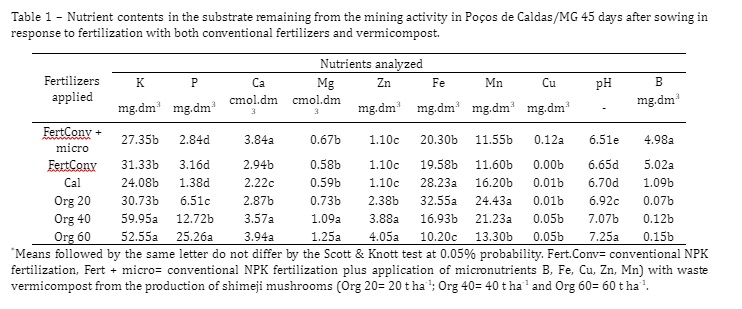Effect of chemical or organic fertilizers in mining remnant substrate on forage production and marandu grass morphogenesis
DOI:
https://doi.org/10.21708/avb.2024.18.1.12050Abstract
Mining drives economic development, but it frequently alters the fertility of remaining soil or substrates. Increasing organic matter in these substrates has been a critical factor for the successful recovery and establishment of plants. In this study, the development of ‘Marandu’ Urochloa brizantha in a Cambisol substrate, a remnant of bauxite mining, was assessed in the municipality of Poços de Caldas-MG, in response to chemical and organic fertilizers derived from vermicomposting of residues from the production of shimeji mushrooms. An experiment was conducted in a greenhouse, where six treatments, namely: conventional fertilizers (FertConv; FertConv + micro and Cal) and exclusively with the use of vermicompost (20, 40 and 60 t ha-1) were evaluated in a completely randomized design in four replications. Fertilization with vermicompost resulted in significant increases in nutrients. Stem and leaf elongation rates, leaf appearance rate, phyllochron, tiller density and dry matter were influenced by both organic and conventional fertilization. However, the greatest benefits were observed with the application of vermicompost. After 90 days of growth, using conventional fertilization, there were no significant increases in the mentioned variables. The use of vermicompost is effective in improving the fertility conditions of the post-mining substrate, with significant impacts on the development of ‘Marandu’ grass, a fact that can contribute to the recovery of areas impacted by mining. Chemical fertilization based only on chemical fertilizers did not result in increases in TAlC, TAlF, TApF, DPP and DM until 90 days of initial growth of ‘Marandu’ grass.
Downloads

Downloads
Pubblicato
Fascicolo
Sezione
Licenza
Copyright (c) 2024 Acta Veterinaria Brasilica

TQuesto lavoro è fornito con la licenza Creative Commons Attribuzione 4.0 Internazionale.
Autores que publicam na Acta Veterinaria Brasilica concordam com os seguintes termos: a) Autores mantém os direitos autorais e concedem à revista o direito de primeira publicação, com o trabalho simultaneamente licenciado sob a Licença Creative Commons Attribution que permite o compartilhamento do trabalho com reconhecimento da autoria e publicação inicial nesta revista. b) Autores têm autorização para assumir contratos adicionais separadamente, para distribuição não-exclusiva da versão do trabalho publicada nesta revista (ex.: publicar em repositório institucional ou como capítulo de livro), com reconhecimento de autoria e publicação inicial nesta revista. c) Autores têm permissão e são estimulados a publicar e distribuir seu trabalho online (ex.: em repositórios institucionais ou na sua página pessoal) a qualquer ponto antes ou durante o processo editorial, já que isso pode gerar alterações produtivas, bem como aumentar o impacto e a citação do trabalho publicado (Veja O Efeito do Acesso Livre).


 Esta obra está licenciada com uma Licença
Esta obra está licenciada com uma Licença 